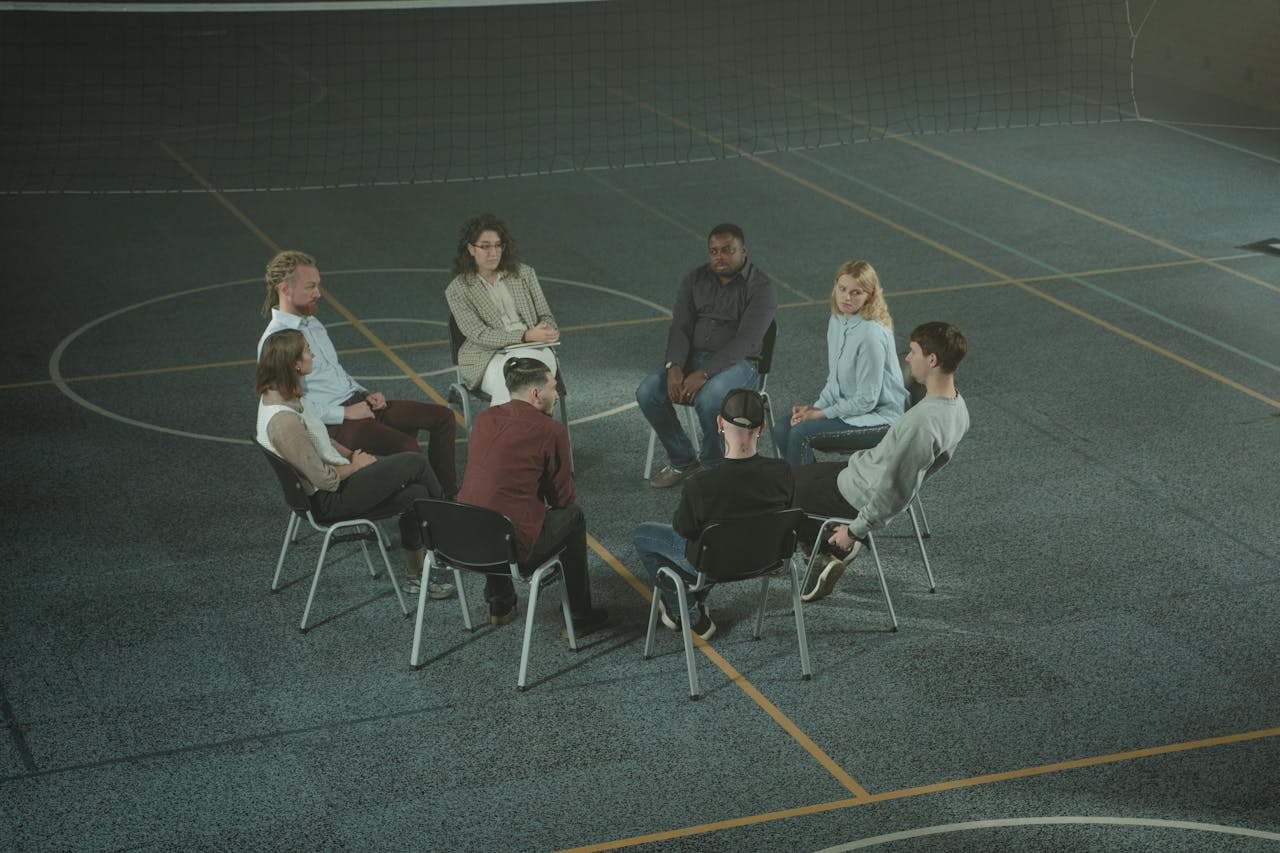Two things help maintain and grow relationships: honesty and vulnerability. If we are not honest about our unhappiness with others, we cannot build deep connections because most relationships are built on the lie that everything has to be good all the time.
We’ve even given union in grief a bad name by calling it trauma bonding. The truth is, everything is impermanent, which means it can cause sadness. That’s if we don’t understand the truth of impermanence.
Community from Suffering
Support groups are a great way for those who are broken-hearted to build bonds. They are kind of the opposite of mainstream belonging, as before, we are expected to have value as social people.
Most groups won’t let you in if they don’t see you as a social person in areas outside of the group. It’s a way to demonstrate whether or not a person can comply with social dynamics.
However, in social groups, one’s isolation is key to companionship. No one joins a support group because everything is fine. Support turns what we consider shame into the very thing that makes a person worthy of joining.
While attending these meetings, there’s no need to pretend that everything is fine.
You really can’t say the same thing about other group dynamics. Members can live their truth (as impermanent as it is) without needing to posture or perform.
They are allowed to tell their story regardless of how messy and incomplete it is. And yes, tears are allowed.
There is no need to appear strong; it allows those around us to empathize, as we are all going through something. Sadly, we have very little opportunity to express it.
What Does Support Look Like?
Members of these support groups do exactly what the title says. They support.
There’s no need to fix anyone who is attending a meeting. Individuals have the chance to empathize with others, not because they are thinking about solutions as the other person talks.
They see another person’s struggle in their own. This is true empathy.
It has nothing to do with walking in another person’s shoes, but rather with recognizing that my struggle and your struggle are the same, regardless of their outward form.
As ironic as it might sound, dismay tends to create a bridge towards others because it highlights our humanness. It solidifies the fact that we won’t be here forever, and this truth is something we all share.
Speak to a Therapist
One of the reasons why dating has been difficult for me is that it seems people are no longer looking for someone to confide in.
It seems like most people want the illusion of a perfect relationship built solely on joy and positivity.
So much so that when a hint of suffering seeps through, the person looking for the fairy tale ending can’t handle any negative emotion.
I’ve read dating profiles that say they are looking to be cared for, but not to be someone’s therapist. It’s to say that we can only confide in a “professional.”
In my opinion, any form of connection between two people that erases perceived separation is love.
To ask a therapist to empathize with my perceived issues is to say we’ve successfully commercialized love.
There is a difference between telling one’s story and complaining. Telling a story involves a bit of detachment, since we know it happened in the past.
Complaining, by contrast, stays attached to the story by trying to transfer the blame to another person. Nobody wants to hear that.
Confiding in Others
We can no longer confide in each other because sadness often leads to judgment.
No one wants to share their true feelings for fear of having to defend them. Those who have friends who can sit with someone in sorrow are pretty lucky.
It’s more typical for friends to try to give us advice and tell us how we should be feeling. Many people will say negative emotions are well… negative.
The thought process involves quickly shifting your mindset back to happiness, regardless of your actual feelings.
This, my friend, is what we call toxic positivity. It’s hard to really call it toxic because the friend’s intentions are pure, yet what we really need in times of sorrow aren’t solutions.
Nothing needs to be fixed. Yet, in our culture, the first thing we look for is change.
Questions and Responses
Without honesty, we hide our true feelings, and without vulnerability, we can’t build real trust. Both are necessary for meaningful and lasting connections.
Not at all. Sharing sadness is part of being human. It allows others to empathize and builds stronger connections than pretending everything is perfect.
In support groups, people don’t need to perform or hide pain. Instead, they find belonging through openness, empathy, and shared struggles.
It often reflects a fear of handling negative emotions. Many people seek positivity alone, but true intimacy encompasses both joy and sorrow.
Sharing your story comes from reflection and acceptance. It’s about expressing experience. Complaining often keeps blame alive and doesn’t allow healing.
Toxic positivity is when people dismiss sadness by insisting on happiness. It’s harmful because it silences genuine emotions rather than fostering empathy and healing.

